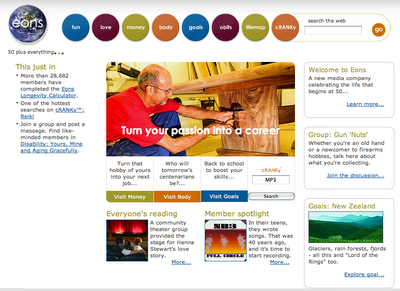
Eons, a 'MySpace' for the boomer set.
Quickie Facts:
"Our goal is to be the center of gravity on the Web for adults 50-plus," says Linda Natansohn, senior vice president for strategic development at the firm, a Charlestown, Mass., offshoot of job-board giant Monster.com.
300,000 others in recent weeks have logged on
2 million page views to date — more than 800 affinity groups, with interests that include gardening, digital photography, and anti-quing, have already been formed.
Five partner corporations — including Hyatt, Liberty Mutual, and Verizon — back Eons and serve as information providers.
Many of the site's features generated in-house and with no intent other than to enrich.
A feature called cRANKy is "the first age-relevant search engine". When its research showed that senior users were frustrated by enormous, largely irrelevant yields found by major engines, Eons built in a vetting process that pulls down top sites based in part on its own editors' reviews and previous users' ratings.
"[Eons] is purpose-driven, vs. a lot of the younger sites," says Natansohn. "It's a good place to hang out, but at Eons we've got lots of important things we want people to come and do."
Eons will pursue growth by taking a role far beyond that of basic sites built around communities of interest — it has set out to be a master aggregator of senior-specific tools and services.

*But one good question stands: "Is being over 50 years old a strong enough affinity? I'm not so sure," says Howard Rheingold, a writer and well-regarded expert on the social implications of communications technology.
A recent study by Jupiter Research found older users to be the group least interested in online social networking, says Corina Matiesanu, a senior analyst there.
Still, Ms. Matiesanu says, 20% of nearly 900 respondents ages 55 and older were open to the function. And Jupiter estimates that 62.4 million over-50 adults will be online by 2010.
"The fastest growing group for Internet dating is older people," Gloria Steinem tells The New York Times.
"There's a strong bias that we have toward interacting with people who are demographically and physically similar to ourselves," says David Krackhardt, a professor of organizational behavior at Carnegie Mellon's Heinz School and a leading expert on social networks. Age, he says, "is one of the strongest, most persistent predictors of how networks form."
via USA Today and Christian Science Monitor
No comments:
Post a Comment